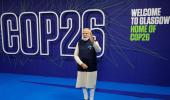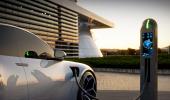'If we are to be a contributor to the economy, we have to reduce carbon and imports.'
'We will achieve both -- that's our target.'

Toyota Kirloskar Motor will put the Innova Hycross on the market in January.
The model, expected to be priced at more than Rs 20 lakh (Rs 2 million), will have hybrid options apart from gasoline.
This is the first hybrid offer by the company in the mainstream UV (utility vehicle) segment after the Hyryder.
In an interview recorded a few days before his death of a heart attack, Vikram S Kirloskar, vice-chairman, Toyota Kirloskar, told Shally Seth Mohile/Business Standard that his company is content with pursuing hybrid technology even as others have chosen the pure battery electric route to reduce carbon emission.
Toyota has been almost a lone-ranger when it comes to hybrids. Given that the policy push is unidirectional (on EVs), does it hurt?
No. We have taken a stand that we are in for overall carbon reduction.
Scientifically, in India, on a well-to-wheel basis we are 100 per cent sure that hybrids have a much lower carbon footprint than any other technology.
In my opinion, long-term science is the only thing that works.
The share of renewable energy as a percentage of total generation is only 30 per cent.
Unless this goes up I don't see carbon emission coming down.
We are content with hybrids, and are testing flex fuels.
I think flex fuels will do both -- reduction in carbon and also bringing down imports.
If we are to be a contributor to the economy, we have to reduce carbon and imports.
We will achieve both -- that's our target. The choice of technology will be based only on this.
As far as EVs are concerned, we are manufacturing electric motors as well as hybrid transmissions.
There's not much difference between making parts for pure EVs and hybrids. We will focus on what reduces carbon and imports.
So will Toyota stay clear of EVs even as most others are pursuing them?
I am not saying we will stay clear of EVs. We will do what our customers want.
A lot will depend on the market and infrastructure. We are committed to the prime minister's call of 'Make in India', and carbon reduction.
We will make sure our product strategy fits into these.
Do we see any movement on tax reduction on hybrids?
The customer is benefiting from hybrids. If you look at the Hyryder, fuel consumption is half its comparable ICE (internal combustion engine). It's up to the government to figure out.
We haven't asked for tax reduction anywhere. As a country, we need to spend on infrastructure and a whole lot of other areas.
If at all there's any reduction, it has to be over 10 years. It will benefit not only the industry but the economy if the volumes increase.
I don't want a budget deficit. If I have a choice between tax reduction and a lower budget deficit, I will go for the latter.
The Hycross will sell alongside the Crysta. This is a departure from what you have done so far -- replaced the existing model with the new one. What explains this?
There still is very significant demand for the Innova. Both the models are different in design and construction.
A lot of people still want the Crysta, which has a ladder frame design for certain kinds of road conditions.
Although this car (Hycross) can take all kinds of road conditions, we are still retaining it in case some people still want it.
Also, considering that it shares quite a few parts with the Fortuner, it makes sense to continue the model.
What has worked for you in Toyota Motor Corp's alliance with Suzuki Motor Corp? What lies ahead?
We have learnt a lot from each other on manufacturing, purchasing, the cost structure, and efficiency structure.
At a working level there's a very good partnership.
We aren't competing directly on any specific thing.
It has taken a long time because a lot of upfront planning is making sure that the goals are clear from each side.
A broader product line-up has helped our dealer network in getting more people into the showroom and giving better service.
Also, we are likely to hit full volumes at our plant, and we won't have any capacity left by the middle of next year.
The Suzuki Ertiga and Ciaz have been selling as the Toyota Rumeo and Belta, respectively, in some markets as part of the alliance for almost a year. Do we see them here as well?
Each country has a different strategy, depending on customer requirements and pricing. India is a small SUV market.
The interesting thing about the Toyota Suzuki alliance is that each country and the requirements there are being looked at. The strategy is not model-wise, but country-wise.
Feature Presentation: Aslam Hunani/Rediff.com












 © 2025
© 2025